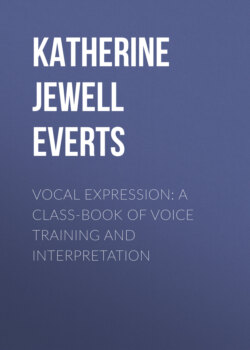Читать книгу Vocal Expression: A Class-book of Voice Training and Interpretation - Katherine Jewell Everts - Страница 8
На сайте Литреса книга снята с продажи.
TO ESTABLISH A CONSCIOUS PURPOSE
Оглавление"The orator must have something in his very soul he feels to be worth saying. He must have in his nature that kindly sympathy that connects him with his fellow-men and which so makes him a part of the audience that his smile is their smile, his tear is their tear, the throb of his heart the throb of the hearts of the whole assembly."—Henry Ward Beecher.
We have said that whatever part in the world's life we choose or are chosen to take, it remains precisely true that to speak effectively is essential to fulfilling, in the highest sense, that function. Whether the occupation upon which we enter be distinguished by the title of cash-girl or counsellor at law; dish-washer or débutante; stable-boy or statesman; artist in the least or the highest of art's capacities, crises will arise in that calling which demand a command of effective speech. The situation may call for a slow, quietly searching interrogation or a swift, ringing command. The need may be for a use of that expressive vocal form which requires, to be efficient, the rugged or the gracious elements of your vocabulary; the vital or the velvet tone; the straight inflection or the circumflex; the salient or the slight change of pitch; the long or the short pause. Whatever form the demand takes, the need remains for command of the efficient elements of tone and speech if we are to become masters of the situation and to attain success in our calling. How to acquire this mastery is our problem. How to take the first step toward acquiring that command is the subject of this first study.
Is there a student reader of these pages who has not already faced a situation requiring for its mastery such command? Listen to Mr. James again:
"All life, therefore, comes back to the question of our speech, the medium through which we communicate with each other; for all life comes back to the question of our relations with each other. These relations are possible, are registered, are verily constituted by our speech, and are successful in proportion as our speech is worthy of its human and social function; is developed, delicate, flexible, rich—an adequate accomplished fact. The more we live by it, the more it promotes and enhances life. Its quality, its authenticity, its security, are hence supremely important for the general multifold opportunity, for the dignity and integrity, of our existence."
Is there one among you whose relations with others would not have been rendered simpler, truer, clearer at some critical moment had your "speech been more worthy of its great human and social function?" Then, do you hesitate to enter upon a study which shall make for clarified relations and a new "dignity and integrity of existence?" Anticipating your reply, I invite you to take a first step in Vocal Expression. How shall we approach the subject? How did you begin to master any one of the activities in which you are more or less proficient? How did you learn to swim, or skate, or play the violin? Not by standing on the shore and gazing at the water or ice! Not by looking at violins in shop windows! No! You began by leaping into the water, putting on your skates and going out on the ice; taking the violin into your hands and drawing the bow across the strings. But you say: "We have taken the step which corresponds to these in speech! We can talk!" Exactly! But what command of the art of skating or swimming or playing the violin would the artist in any of these activities have achieved had he been content to stop with the act of jumping into the water, going out on the ice, or drawing the bow across the violin? The question's answer calls up an illuminating analogy. Are not most of us in regard to our mastery of speech in the condition of the skater, the swimmer, the fiddler in the first stage of those expressive acts? Are we not floundering in the water, fallen on the ice, or alienating the ears of our friends? "We are so! We confess it!"—every time we speak.
And so to-day we shall offer no argument against entering upon an introductory study—we shall take our first step in the Art of Vocal Expression. But we shall take it in a new spirit—the spirit of an artist bent upon the mastery of his art. If we flounder or fall, we shall not be more content in our ignominy than is the choking swimmer or the prostrate skater. If we produce painful instead of pleasing sounds with our instrument, we shall not persist in a merciless process of tone production; but we shall proceed to study diligently the laws governing the control of the instrument until we have mastered its technique and made it an agent of harmonious intercourse. We shall take the first steps with a conscious purpose, the purpose to make our speech worthy of its great social and human function.
Then in this spirit I invite you "to plunge." I furnish as the material for your experiment these sentences:
